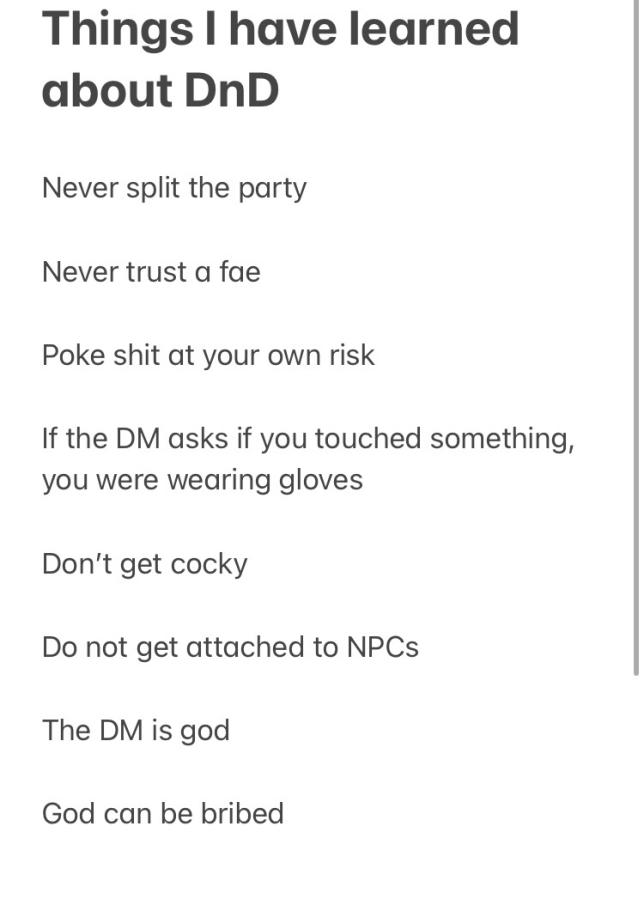this post was submitted on 16 Dec 2023
473 points (97.8% liked)
RPGMemes
10489 readers
91 users here now
Humor, jokes, memes about TTRPGs
founded 2 years ago
MODERATORS
you are viewing a single comment's thread
view the rest of the comments
view the rest of the comments

As someone who hasn't played much DnD, but has a bit of experience with other systems: What's the reason behind not splitting the party? Maybe it's just the mechanics and rules of the systems I have played, but splitting the party has led to cool emergent stories and opportunities for unexpected drama.
There are a number of issues with splitting the party in DnD.
The most serious problem, and the main reason to avoid it, is the potential for a frustrating session for some of the players. DnD as a game is heavily geared towards dungeoneering and combat, most of the mechanics deal with this, and a lot of adventure designs are intended to funnel characters into dangerous situations or fights.
So... if you're adventuring, and you split up, there's a high chance that one or both groups end up in a fight where some characters aren't present. Problem here is, combats in DnD take a long time, often over an hour, to resolve - so you end up stuck in a situation where some of your players are sitting around with nothing to do for half a session or longer.
Very good DMs can design or improvise around this problem in a variety of ways. For example, you could move a couple of NPCs the party are supposed to meet, so they're also present at the fight, then hand off control of them to the inactive players - you could give those players monsters to control, you could try to arrange your combat to happen nearby enough that the missing characters can "catch up" and join after a round etc etc etc.
In general, it's less "bad" to split the party for investigations, downtime, city/town scenes, shopping, research, or narrative sections - although newer groups can struggle even here. It's important for the DM to go back and forth between players to make sure everyone is engaged and having a good time, and to make sure everyone gets to play about the same amount of the time. This can be difficult for inexperienced groups to juggle correctly.
Some players struggle heavily with "stonewalling". Stonewalling is the process of disregarding information your character doesn't know when making decisions (but information that YOU do know.). Splitting the party often results in players hearing information that their characters don't know, and needing to compartmentalize that so as not to use it when making decisions or roleplaying. This is difficult for some players.
DnD is also a game that's generally viewed as being "high risk" especially with more adversarial DMs. You should discuss with your players in session 0 the style of campaign you're running and how "lethal" it will be, whether you will be ruthless and play monsters to the best of their abilities as a test of the player's mechanical skills, or if you'll be more relaxed and aim for a more "narrative-focused" story. Many groups play the game as a mechanical combat game, where they try to balance fights to be close calls, because that tension is exciting - and "splitting the party" can often result in having a lot of characters die when they reach a fight unprepared for the challenge.
The main issue though is, there's a high chance if you split the party, that some players will end up in a combat, and some players will be left out, and that can last for over an hour.